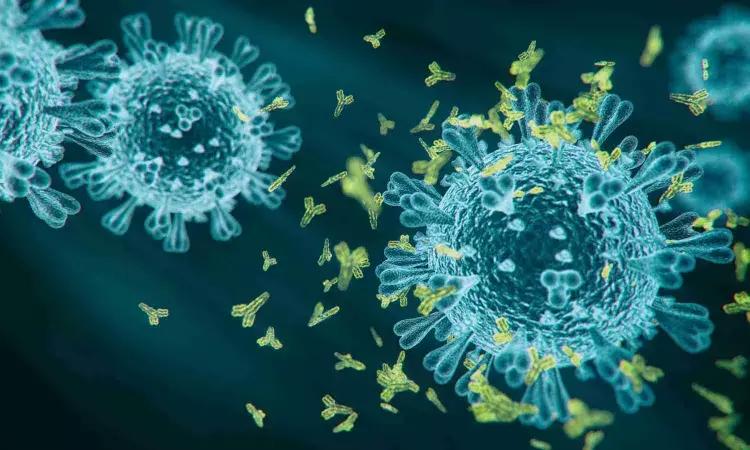Galectin 3 Promising Biomarker For Predicting Long COVID Among Patients Of Covid 19: Study
- byDoctor News Daily Team
- 07 July, 2025
- 0 Comments
- 0 Mins

Researchers have found that Galectin-3 could serve as a reliable biomarker for predicting post-COVID syndrome, especially when measured 60 to 120 days after SARS-CoV-2 infection. This finding comes from a detailed study aimed at identifying biomarkers that can forecast the development of post-COVID syndrome. This recent study was published in the journal Respiratory Medicine by Andrea Portacci and colleagues.
Post-COVID syndrome, characterized by persistent symptoms such as exercise-induced dyspnea, poses a significant challenge for clinicians. Despite various studies, reliable biomarkers that can predict its development remain scarce. This study aimed to explore the relationship between Galectin-3 blood concentrations and post-COVID syndrome.
The objective of the study was to evaluate the potential of Galectin-3 as a predictive biomarker for post-COVID syndrome by analyzing its blood concentrations in patients who had recovered from acute COVID-19.
The study was a single-center, prospective, observational study involving 437 consecutive patients attending an outpatient clinic for post-COVID assessment. For each patient, clinical, functional, and radiological data were recorded, along with several blood biomarkers associated with COVID-19, including Galectin-3. The predictive performance of Galectin-3 for post-COVID syndrome was assessed using Receiver Operating Characteristic (ROC) and multivariate regression analysis.
The key findings of the study were as follows:
• Among the blood biomarkers tested, Galectin-3 was the only one correlated with the development of post-COVID syndrome.
• Although the Cox regression model showed insufficient performance statistically, correlation coefficients and ROC curve analysis demonstrated a strong relationship between Galectin-3 levels and the time elapsed since acute COVID-19.
• Specifically, Galectin-3 showed greater predictive power when measured 60 to 120 days after infection.
• The findings suggest that Galectin-3 could be a valuable biomarker if evaluated correctly during follow-up to avoid misinterpretations.
The study's results indicate that Galectin-3 could play a crucial role as a predictive biomarker for post-COVID syndrome. Its predictive power is particularly strong when measured within the 60 to 120-day window post-infection. These findings underscore the importance of timing in the evaluation of Galectin-3 levels to maximize its predictive accuracy.
Galectin-3 has the potential to serve as an important biomarker for predicting post-COVID syndrome, but its evaluation should be carefully timed during follow-up assessments to ensure accurate predictions and avoid misinterpretations. This discovery could significantly enhance the management and treatment strategies for patients recovering from COVID-19.
Reference:
Portacci, A., Amendolara, M., Quaranta, V. N., Iorillo, I., Buonamico, E., Diaferia, F., Quaranta, S., Locorotondo, C., Schirinzi, A., Boniello, E., Dragonieri, S., & Carpagnano, G. E. (2024). Can Galectin-3 be a reliable predictive biomarker for post-COVID syndrome development? Respiratory Medicine, 226(107628), 107628. https://doi.org/10.1016/j.rmed.2024.107628
Disclaimer: This website is designed for healthcare professionals and serves solely for informational purposes.
The content provided should not be interpreted as medical advice, diagnosis, treatment recommendations, prescriptions, or endorsements of specific medical practices. It is not a replacement for professional medical consultation or the expertise of a licensed healthcare provider.
Given the ever-evolving nature of medical science, we strive to keep our information accurate and up to date. However, we do not guarantee the completeness or accuracy of the content.
If you come across any inconsistencies, please reach out to us at
admin@doctornewsdaily.com.
We do not support or endorse medical opinions, treatments, or recommendations that contradict the advice of qualified healthcare professionals.
By using this website, you agree to our
Terms of Use,
Privacy Policy, and
Advertisement Policy.
For further details, please review our
Full Disclaimer.
Recent News
Progestogen-Only Pills Linked to Higher Asthma Ris...
- 27 October, 2025
Weekly Injectable Treatment May Transform Parkinso...
- 27 October, 2025
In Childhood Psoriasis, Obesity and Nail Involveme...
- 27 October, 2025
Childhood to Adulthood BMI Shift Linked to Midlife...
- 27 October, 2025
Daily Newsletter
Get all the top stories from Blogs to keep track.


0 Comments
Post a comment
No comments yet. Be the first to comment!